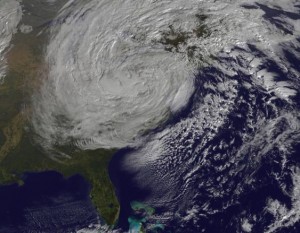
Satellite image of Superstorm Sandy taken at 10 AM EDT Tuesday. Image NASA GSFC. Click for info at Climate Progress.
Did Sandy happen because of global climate change? Answer: It’s quite possible according to one of the world’s leading climate science experts, Dr. Michael Mann from Penn Sate University and author of The Hockey Stick and the Climate Wars: Dispatches From The Front Lines:
Climate scientists can see that climate change is playing a role in setting the context for these storms, in particular the record levels of North Atlantic ocean warmth that is available to feed these storms with energy and moisture. Some of the more robust connections we can draw: 1) a foot of sea level rise over past century contributed to a worse peak coastal surge (13ft at Battery Park in NYC) than otherwise would have been observed and (2) near-record SSTs off east coast of U.S. (some–though obviously not all—of which can be attributed to anthropogenic warming) almost certainly added energy and moisture to the storm. In fact, the increased flooding and rainfall associated w/ tropical cyclones and hurricanes due to warmer SSTs over which they are forming and traveling, is one of the most robust climate change impacts on these storms.
In short, we can’t blame the existence of a single hurricane on global warming just like we can’t blame a single roll of snake-eyes on loaded dice — but we’ve been rolling a lot of snake-eyes lately.

xkcd’s The Saga of Epsilon and Zeta. The 2005 Atlantic Hurricane Season ended in 2006.
Look at what happened to NYC and NJ. Most of the damage was a storm surge.
Sea level rises of a few feet aren’t a big deal.
Sea level rises of a few feet added in with a large hurricane and a high tide are.
The projected sea level rise is 3-6 feet by 2100. We are going to see higher and higher storm surges. Not every day. Not even every year. But it only takes one to cause huge amounts of damage somewhere.
That is roughly what happened to New Orleans. The vast majority of the time, everything was just fine.
It’s becoming obvious that the extremes are where we will see the effects of global warming. A few degrees hotter, big deal. Longer droughts, hotter heat waves, higher floods, and higher storm surges, are a big deal though.